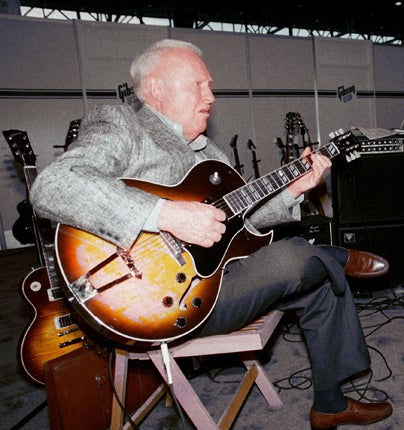Herb Ellis: Dextrous and distinctive guitarist who worked with Oscar Peterson, Ella Fitzgerald and Billie Holiday

Your support helps us to tell the story
From reproductive rights to climate change to Big Tech, The Independent is on the ground when the story is developing. Whether it's investigating the financials of Elon Musk's pro-Trump PAC or producing our latest documentary, 'The A Word', which shines a light on the American women fighting for reproductive rights, we know how important it is to parse out the facts from the messaging.
At such a critical moment in US history, we need reporters on the ground. Your donation allows us to keep sending journalists to speak to both sides of the story.
The Independent is trusted by Americans across the entire political spectrum. And unlike many other quality news outlets, we choose not to lock Americans out of our reporting and analysis with paywalls. We believe quality journalism should be available to everyone, paid for by those who can afford it.
Your support makes all the difference.Les Paul, doyen of guitarists everywhere, was in no doubt about Herb Ellis. "If you're not swinging, he's gonna make you swing. Of the whole bunch of guys who play hollow-body guitar I think Herb Ellis has got the most drive."
When Oscar Peterson needed a guitar player to complete his trio he was sent to a small bar in Toronto to listen to another trio. This trio, which called itself Soft Winds, was actually the rhythm section from the Jimmy Dorsey Big Band. Its guitar player was Herb Ellis. Peterson was impressed with what he heard. Ellis joined him and stayed for the next six years.
"It wasn't the easiest job," Ellis told me. "In fact it was the hardest job I ever had. We had a lot of complex arrangements and Oscar insisted that you had them at your fingertips. Everyone was very impressed with the speed at which we played but actually that wasn't the hardest thing for me. Playing your own solos was the easiest part, that was the ice cream. But playing the backgrounds that Oscar wanted when he was playing was most hard... for me he was the greatest piano player in the world and he certainly was the fastest."
Although a dexterous modernist, Ellis never relinquished his powerful grip on the classic blues tradition and was a delight to watch as, with a permanent look of agony on his face, he mouthed the notes as he played them on the strings.
Born near Dallas, he was much influenced initially by his fellow Texan Charlie Christian. However, over the years Ellis developed his own style, as distinctive almost as that of Christian had been before him. He had started on a harmonica he found at home, progressed to his sister's banjo and then switched when he was seven to a guitar someone brought to the house. Completely self-taught, he enrolled at North Texas State University in 1941 to study, not guitar, but composition and harmony. His fellow students included Jimmy Giuffre and Gene Roland, both to become internationally famed jazz composers later on. But Ellis's money ran out and he had to drop out and tour with a band from Kansas for six months to raise the funds to enrol again. He finally majored in 1943 when he left to join the once-famous but by now failing Casa Loma band led by Glen Gray.
In 1945 Jimmy Dorsey hired Ellis for his big band, and it was here that the Soft Winds trio matured, leading to the job with Peterson which began in 1953. Peterson worked in the stable of all-stars maintained by the impresario Norman Granz, and endless doors opened for Ellis as a result. The trio became the house rhythm section for Granz's record labels and the guitarist worked with and backed players like Ella Fitzgerald, Dizzy Gillespie, Stan Getz, Billie Holiday, Ben Webster, Louis Armstrong and Buddy Rich. Granz's concert unit Jazz at the Philharmonic, with Ellis included, toured the world ceaselessly from winter to autumn, returning home for the final part of each year to create the unending flow of jazz albums that Granz supervised.
The demands that Peterson made on him led Ellis to become one of the most dextrous and imaginative guitarists, soon the leading exponent of the particular kind of blues that came from Texas. By the time he left the trio in November 1958 he had become irreplaceable. "After I left Oscar said that he'd never use the guitar integrally in the trio again, which was quite a compliment for me," Ellis said.
He went to work with Granz's singer Ella Fitzgerald, staying with her until 1960, when he decided to give up touring. "I stayed at home in Los Angeles for almost 17 years and did studio work," he said. "It was a painful way to make a living, but I must say that it paid very well."
Most of Ellis's nights were free so he continued to take jazz jobs, playing notably with Bill Berry's LA Big Band, where Berry wrote and recorded an effective and evocative setting of "Easter Bonnet" as a showcase for his guitarist. Signed for the Concord label, Ellis graced a multitude of albums by other people as well as a substantial clutch under his own name. He worked often with another guitar player, Joe Pass, but substantial success came in 1974 when, with Barney Kessel and Charlie Byrd, he formed Great Guitars. This was an exciting virtuoso group where the three challenged each other and it was to tour the world and record albums until well into the 1990s.
Herbert Mitchell Ellis, guitarist: born Farmersville, Texas 4 August 1921; married 1957 Patti Gahagan (one son, one daughter); died Los Angeles 28 March 2010.
Join our commenting forum
Join thought-provoking conversations, follow other Independent readers and see their replies
Comments